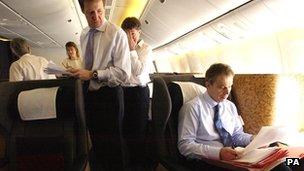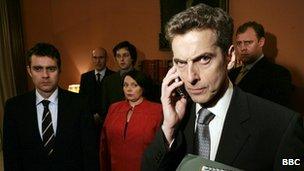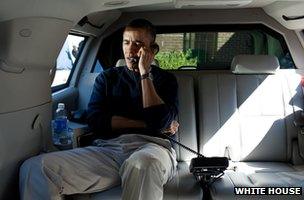Viewpoint: Alastair Campbell - why self-doubt is a good thing
- Published
- comments

Tony Blair's former spokesman Alastair Campbell explains why he thinks that self-doubt should get a better press.
"Where there is doubt, there is no doubt."
I don't know where that saying originates, but I heard it first from a good friend and famous football manager, Sir Alex Ferguson. He uses it for transfers and team selections. I've used it for a multitude of decisions in my life, like whether or not to work for Tony Blair.
Not just doubt, either - but self-doubt. Cue hollow laughter from some of you - did they just say Alastair Campbell? What does he know about self-doubt, this man who in Downing Street seemed to have self-confidence to a fault, and who would surely think of doubt as a sign of weakness, a fear never to be admitted?
But in fact not only was the sense of self-doubt strong when Tony Blair asked me to be his spokesman and strategist - it was something that stayed with me for much of the time I was with him, and has been a prominent part of my life and make-up before and since.
I see it as a strength, not a weakness, because, usually, I haven't allowed it to disable me. Instead, it is the means by which I prepare, consider other options and perspectives, strive for clarity about what can be attained and what cannot - and then, critically, stop the doubting, and act.

Campbell says he felt self-doubt when he was asked to be Tony Blair's spokesman
Galileo called self-doubt "the father of all invention". Self-doubt that doesn't lead to decision or action is ultimately self-defeating, and creates a numbing negativity - whereas self-doubt that leads to resolution of the doubts can be a remarkable source of energy and creativity.
I'm a depressive. When self-doubt is of the negative kind, I'm in a depressive mindset. When it's a source of energy and creativity, then the words of Galileo seem both valid and wise.
So for all these reasons, when Tony first asked me, I asked for a month to think about it.
Linked very much to self-doubt were the scars of my nervous breakdown in 1986. I'd cracked under pressure. If I took this job, I would know far greater pressure - could I cope without breaking down again?
When I was being interviewed by the BBC's Stephen Nolan recently, he said: "I just don't get it." What he couldn't get was how I - someone he'd introduced as a "hard man", someone he'd always thought of as a man of certainty, not doubt - could willingly go on air and describe what had been happening inside my head when it exploded 26 years ago in a cacophony of music, speech and random sound, as I went through a full-blown crack-up.
In answering, I sought to convey that though my experience was an extreme one, it was nonetheless born in the kind of despair and negative self-doubt that all of us may know, because in this context at least, we really are all in this together.
At the time, it helped to hear of others who had been through such experiences and survived. It is partly because I know others are experiencing the same thing now, that I talk about it so freely. I hope it helps. It certainly helps me. Talking is therapy.
It was the worst day of my life - at the time - one during which, from waking with a hangover to rushing for a flight to Scotland, I felt a relentless march towards what, in my developing madness, I imagined was going to be my death.
You will know by now that I didn't die, which may be a disappointment to some. Instead I was arrested by two plain-clothes policemen, and taken into custody, where my madness saw me strip naked and draw messages on the walls of my barren Hamilton cell. A doctor arrived, and, on condition I sought help, I was taken to Ross Hall hospital in Paisley.
I was sedated, slept, and after several scary days of paranoia, shakes from alcohol withdrawal, and engagement with a kindly psychiatrist called Ernest Bennie, I began the slow road to recovery. It's a road I continue to tread.
I now look back on 7 March 1986, not as the worst day of my life, but as the best. I faced up to problems, like alcohol. I admitted to obsessions, like politics and a desire to see the back of the Tories.
I came to understand what really mattered - beliefs, values, friendship, above all perhaps the people I hadn't been kind to as I'd allowed myself, through overwork, over-drink and monomania, to be sucked into a vortex of self-destruction, which of course left others caught up in its wake also close to destruction.
The media tends to delight in black and white, one-dimensional images - caricatures almost. So once I set a tone of being a fairly tough-minded press secretary, the media's picture of me was never going to allow space for self-doubt. Yet how could a mind that cracked once not know about self-doubt?
In fact, how could any mind, if being honest with itself, not know about it? It's the most complicated and most sensitive part of our being. To lack self-doubt is to lack humanity, for it's this that compels us to pose the questions that need answers.

Steely Malcolm Tucker of The Thick of It was reportedly modelled on Alastair Campbell
And as I learned many times when briefing a roomful of journalists, it's entirely possible to exhibit public positions of strength and clarity while enduring private feelings of anxiety and doubt. Sometimes, I'm sure, the private feelings showed. But the image perhaps blinded those who'd created it.
I've learned lessons from my breakdown, and from the depressions since. "Try to get good out of anything bad" is one of my life maxims. When you're talking about depression, and that strange feeling of being simultaneously dead and alive, you have to get something good from the bad. Otherwise, you really do find yourself asking "what is the point?", and that's a dangerous place to be.
I'm the same person I was in 1986. I don't drink like I used to. But I still get depressed, can still be self-obsessed, obsessive, brooding and introspective, and can still be riddled with self-doubt at times about what I do and why I do it, not to mention what I don't do and why I don't do it.
And here is perhaps what Nolan found difficult. He only knows the me of three election wins and the Downing Street era - who, amid mayhem in Stormont where Tony Blair was trying to bridge the unbridgeable in Northern Ireland, faced hundreds of doubting journalists with conviction and told them we were inching ever closer to a deal; who, offered the chance to go into the Hutton Inquiry via the back door to avoid loud-hailing protesters, insisted on going through the front door and past them.

Campbell decided to brave the protesters outside when he arrived to testify at the Hutton Inquiry
But didn't I have doubts on such occasions? Of course I did. During that <link> <caption>Hutton Inquiry</caption> <url href="http://news.bbc.co.uk/1/hi/in_depth/uk/2003/david_kelly_inquiry/default.stm" platform="highweb"/> </link> , for example.
Doubt that if I did not give a good account of myself, I might bring about not only my own demise, but the government's.
Doubt that I was putting my family through all kinds of hell, during my absences, but also during times together when on holiday we were invaded by friendly lawyers and hostile journalists, the latter scenting blood.
And did I lie awake and wonder if we could have done something differently, so that Dr David Kelly did not feel his only option was to take his own life? Yes, I did.
Benjamin Franklin once said: "By failing to prepare, you are preparing to fail." But by the time I walked through the protesters I had prepared. I had faced up to the doubts. So I felt strong. Self-doubt became creative, enriching, liberating.
The best preparation is always to ask the deepest and most difficult questions of yourself, and to think deeply about the answers. The sleepless nights are part of the preparation.
Not that this is meant to be said in a tone of triumph. One way forward may emerge, but still carry with it the clutter of self-doubt. If self-doubt waved a flag, its colour would be grey.
Self-doubt remains an essential part of my make-up. But, as I think I've made clear, ultimately I see it as a strength and not a weakness.
My partner Fiona is forever asking, "Why can't you just be happy?'". But it's not that simple. In my little e-book The Happy Depressive - that's me - I advance a rather dark theory. It is that we don't really know if we've lived a happy life until we near its end.
Perhaps that's a non-believer's way of trying to stick to values that keep us broadly on the straight and narrow.
Which brings us to God. Now there's an area riddled with doubt. I was raised to believe, but soon gave it up. It flickers now and then, like when my friend Philip Gould died recently, aged just 61, and I saw the faith resonating from him, and comforting him, and in what he called "the death zone" giving him an equilibrium he lacked for much of his life.
But then my rational mind kicks in. "Where there is doubt, there is no doubt." This time, the doubt turned me against the proposition, not for it - although, as Philip used to tease, the door is never closed.
Believers in my family are convinced I will "do God" before I go. Tony Blair always said he was sure I was deeply religious deep down, but worried I might become an Islamic fundamentalist.
Finally, I want to emphasise what I alluded to earlier - that we really are all in this together. If we think otherwise, we delude ourselves. A little bit of self-awareness, and we soon admit that when the lights switch off and the day closes down, we feel those twinges of self-doubt.
Can I? Should I? Suppose I? Did I really? But that's normal. It's what we do with the self-doubt that matters.
That goes for world leaders, too. They are not exempt from self-doubt, whatever a crystal clear soundbite or a beautifully delivered speech may convey, and probably they wouldn't last long as world leaders if they owned up to self-doubt too often.
Remember how long Barack Obama took to decide on his policy in Afghanistan? His enemies accused him of dithering, but he was going through his doubts, testing them, casting them aside, settling finally for what he hoped would work?

Even the self-assured experience doubt
Before him, Bill Clinton knew all about self-doubt. "The key word is HALT," he once told me. It means stop. But it also means Hungry, Angry, Lonely, Tired. A US president won't go hungry. But he or she will get angry, lonely, tired - do things they shouldn't.
Tony Blair was a conviction leader, but that didn't mean he lacked self-doubt. I recall once in opposition, when he feared that the big beasts - John Prescott, Gordon Brown and Robin Cook - would never accept him as they had his predecessor John Smith. That was self-doubt, and I often saw it. But it was all part of constant self-examination, which ultimately led to an inner strength.
I can recall the exact moment the last vestiges of self-doubt about taking up Tony's offer of becoming his press secretary vanished. It was when he told me he intended to launch a review of Labour's constitution, which he hoped would replace the old socialist Clause 4.
Later, as he prepared to announce this to the Labour conference, he asked me what were the chances this could kill his leadership by the end of the day. I said about 10%. It was a risk, but one worth taking.
Here was Galileo's old maxim at work - self-doubt "the father of all invention", self-doubt the driving force behind genuine creativity, and ultimate boldness.
And in that moment, in so many ways, New Labour was born.
There it is then.
Self-doubt can be unnerving, scary even, but it need not panic us into thinking it's an inevitable sign of weakness and failure. It need not paralyse. It offers the chance to slow down, think, work through, test, face alternatives, be realistic about what can be achieved - and then to act.
And if I say that, there must be something in it - why, I'm almost certain of it myself.
<bold>Alastair Campbell on self-doubt for </bold> <link> <caption>The Essay: The Case for Doubt</caption> <url href="http://www.bbc.co.uk/programmes/b01gcqdb" platform="highweb"/> </link> <bold> to be broadcast on Friday 13 April at 22.45 on BBC Radio 3.</bold>